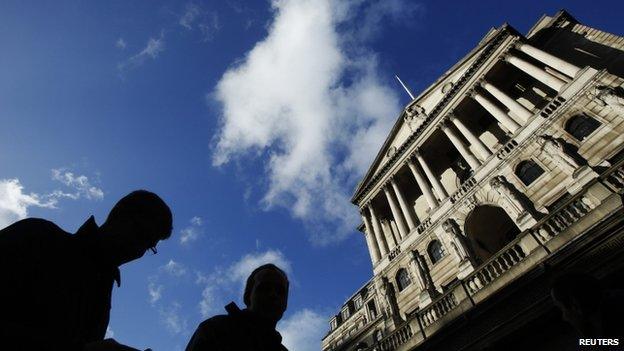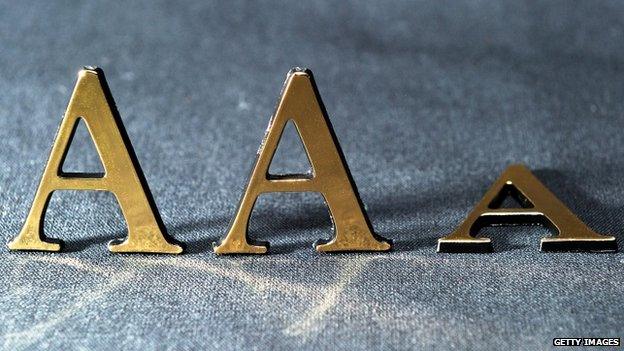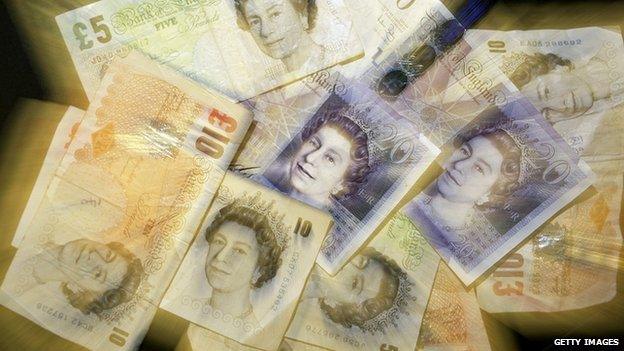Scottish independence: Currency debate explained
- Published

The debate continues over whether a post "yes" Scotland would continue to use sterling as its currency
What currency would Scotland have in the event of independence? It's become one of the big issues, ahead of September's referendum.
On one side, the UK coalition government, made up of the Tories and the Lib Dems, and the Labour Party, say they have ruled out a currency union with an independent Scotland.
On the other, the Scottish government says that following a "Yes" vote, it's in everyone's interests to share the pound and retain the services of the Bank of England.
It's a debate which has sparked discussion on all sides, from politicians to businesses and the financial industry itself.
Here's what you should know about the post "Yes" currency debate.

The case for a currency union...
In its White Paper blueprint for independence, external, the Scottish government says a currency union is vital to let companies go about their business, otherwise there could be a damaging effect in the rest of the UK.
It's also argued sterling would benefit from Scotland's continued involvement given assets like North Sea oil and gas.
SNP ministers also say monetary unions still leave room for significant differences in fiscal and economic policies.
They point to Luxembourg and Belgium, which have been in currency unions for decades but have different tax policies.

The case against a currency union...
The Westminster government says Scotland already has a working currency arrangement, external with the rest of the UK - and it's called the Union.
It says an independent Scotland would face having to agree to (negotiated) constraints on economic policy with the rest of the country.
The UK government also asks why the rest of the UK should enter into a sterling union with Scotland, when recent experience in the euro area has shown how difficult these agreements are to maintain.
They also raise a further scenario. If Scotland failed to make a formal deal on currency, it would be free to unilaterally adopt sterling - a situation under which the Bank of England may simply continue on without taking account of Scottish conditions.

Who is saying what?
Former banking bosses....

John Nugée, former Bank of England senior manager: "The first minister [Alex Salmond] has stated firmly that he hopes to conclude a common monetary area with the continuing UK, enabling an independent Scotland to retain the pound, the services of the Bank of England and the financial underpinning of the UK treasury for Scottish financial institutions. It is indeed almost certainly in Scotland's interest to conclude such an agreement. But it is not in Alex Salmond's power to do so single-handedly. It requires the agreement and consent of the continuing UK government, and it is nothing like as clear that, viewed from England, Wales and Northern Ireland, a common monetary area with an independent Scotland is desirable."
Brian Quinn, former executive director, Bank of England: "By choosing to announce its preference to retain sterling as the currency of an independent Scotland, the current Scottish Government has effectively surrendered its freedom to determine monetary policy and severely circumscribed its freedom of action in the area of public finance. Choosing to rely on the Bank of England to supervise its banks - and other financial institutions - may prove to be an empty choice if it proves necessary to establish its own supervisory institutions in accordance with what is understood to be EU statutes."
Economists and academics....

Jim and Margaret Cuthbert, economists: "Scotland has to be very careful that, in negotiating its relations with bodies like the rest of the UK and the EU, it does not make concessions which will impose constraints which ultimately prove to be crippling. Any choices, for example about forming a sterling currency union with the rest of the UK would have to be viewed very carefully in this respect. An independent Scotland is going to have the will and courage to deal with the other constraints it will face."
Dr Jim Walker, founder and chief economist, Asianomics Limited: "Is the British government contemplating the reintroduction of capital controls in which sterling cannot be moved around freely? I ask this in all seriousness given some politicians' and bureaucrats' reactions to the proposition that an independent Scotland would seek to enter a formal currency union with the rest of the UK, a suggestion made in the interests of friendship, continuity and mutual benefit. If capital controls are not being contemplated, then there is no question about Scotland being able to continue using sterling, and clearly therefore a formal currency union would suit both partners best."
Prof David Blanchflower, former external member, Monetary Policy Committee: "Should the people of Scotland choose independence in next year's referendum it would make sense for Scotland to enter a formal monetary union with the rest of the UK with the Bank of England operating as central bank for the common monetary area. Independence within a currency union would represent a substantial increase in the economic responsibilities of the Scottish Parliament. A currency union would provide the full flexibility to vary tax and spending decisions to target key opportunities and challenges in Scotland - powers that are currently unavailable to the Scottish Parliament."
Prof John Kay, former member, Scottish government's council of economic advisers and visiting professor, London School of Economics: "The currency issue is crucial - Scotland would be right to seek agreement on monetary union with the remaining United Kingdom, but it would be difficult to negotiate an agreement that would be consistent with the fiscal freedom sought through independence.
Prof Andrew Hughes-Hallett, economics and public policy, George Mason University, United States: There's nothing which the Bank of England or the British government could do to stop Scotland using the pound if she so wished. It might not be very desirable, as opposed to a jointly-run, that's to say a multi-bilateral arrangement, by agreement between the two countries."
Bankers and business....

Fitch, credit rating agency: "The monetary arrangement following Scottish independence could become a source of uncertainty even if Scotland remained in the sterling currency zone. As the intensification of the eurozone crisis showed in 2012, a monetary union without fiscal and banking union is unstable and the prospect of an exit from a monetary union could lead to high volatility and market turbulence, potentially detrimental to all members."
Jim McColl, founder of Clyde Blowers, co-signatory in a letter to the Scotsman: "It is in the interests of Scotland and the rest of the UK - the financial firms, wider business community and the people - to maintain the same currency. Many Scottish firms have the vast majority of their customers south of the Border, and Scotland is the second largest export market for English business. The strength of sterling in part relies on Scotland's North Sea oil and gas reserves."
Oliver Harvey, strategist, Deutsche Bank: "Scotland fits an optimum currency area with the rest of the UK very well."
Rod MacLeod and Hamish Patrick, banking and finance lawyers, Tods Murray: "If an independent Scotland keeps the pound, there needs to be an appreciation that, at best, Scotland will have limited control over monetary policy as the junior partner in any currency union or even less influence if a currency pact is rejected."
Politicians and campaigners....

Alistair Darling, leader of Better Together and former UK chancellor: "We are being asked to take a huge leap into the unknown. When Alex Salmond can't even tell us what currency we will have in our pocket it's little wonder people aren't willing to take the risk."
Blair Jenkins, chief executive, Yes Scotland: "The pound belongs as much to Scotland as it does to the rest of the UK. There is no question of an independent Scotland not being able to use sterling because that would be in the best interest of everybody in these islands."
Sir John Major, former UK Prime Minister and chancellor: "A currency union, which the SNP assume is negotiable, would require the UK to underwrite Scottish debts. That cannot, will not, happen if Scotland leaves the Union. There can be no halfway house, no quasi-independence underpinned by UK institutions."
John Swinney, Scottish finance secretary: "Scotland will continue to use the pound, just as we do today because, in Alistair Darling's own words, that is the 'logical' and 'desirable' arrangement for an independent Scotland and the rest of the UK."
Carwyn Jones, Welsh first minister: "I just don't know how this works. If you have a currency union, who decides on monetary policy? You've got two governments potentially with a view on that. "It's a very messy system from Wales's point of view. I'd be very, very worried about any currency system that involved the need to get agreement from different governments."